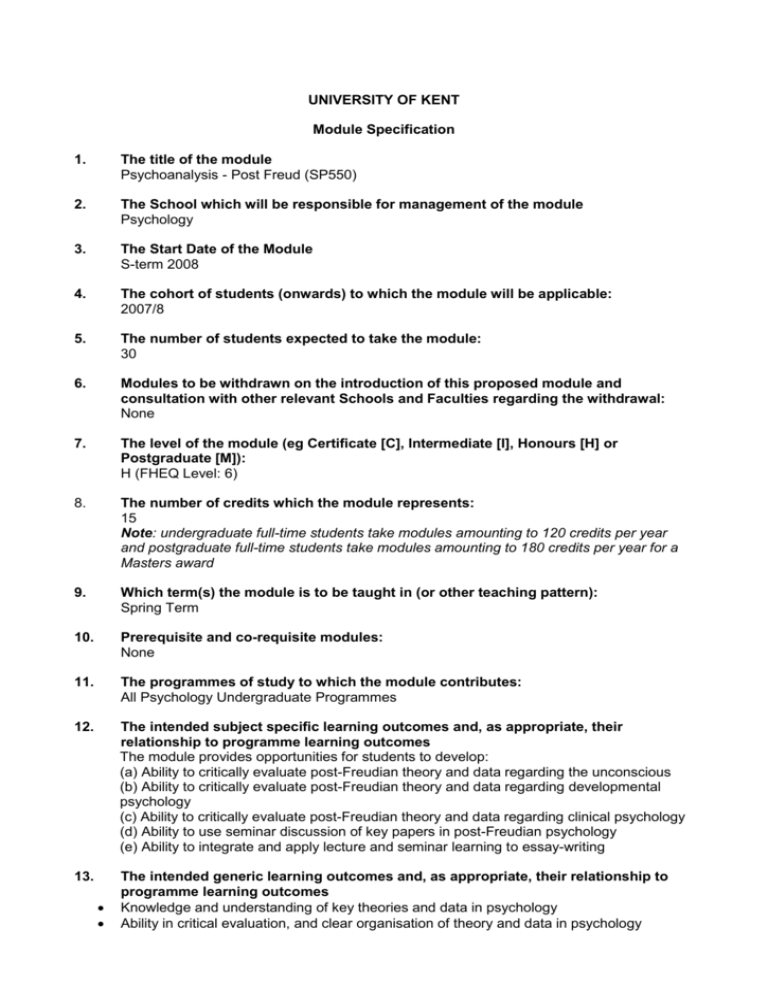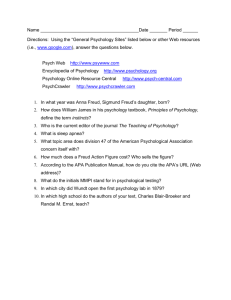University of Kent at Canterbury
advertisement

UNIVERSITY OF KENT Module Specification 1. The title of the module Psychoanalysis - Post Freud (SP550) 2. The School which will be responsible for management of the module Psychology 3. The Start Date of the Module S-term 2008 4. The cohort of students (onwards) to which the module will be applicable: 2007/8 5. The number of students expected to take the module: 30 6. Modules to be withdrawn on the introduction of this proposed module and consultation with other relevant Schools and Faculties regarding the withdrawal: None 7. The level of the module (eg Certificate [C], Intermediate [I], Honours [H] or Postgraduate [M]): H (FHEQ Level: 6) 8. The number of credits which the module represents: 15 Note: undergraduate full-time students take modules amounting to 120 credits per year and postgraduate full-time students take modules amounting to 180 credits per year for a Masters award 9. Which term(s) the module is to be taught in (or other teaching pattern): Spring Term 10. Prerequisite and co-requisite modules: None 11. The programmes of study to which the module contributes: All Psychology Undergraduate Programmes 12. The intended subject specific learning outcomes and, as appropriate, their relationship to programme learning outcomes The module provides opportunities for students to develop: (a) Ability to critically evaluate post-Freudian theory and data regarding the unconscious (b) Ability to critically evaluate post-Freudian theory and data regarding developmental psychology (c) Ability to critically evaluate post-Freudian theory and data regarding clinical psychology (d) Ability to use seminar discussion of key papers in post-Freudian psychology (e) Ability to integrate and apply lecture and seminar learning to essay-writing 13. The intended generic learning outcomes and, as appropriate, their relationship to programme learning outcomes Knowledge and understanding of key theories and data in psychology Ability in critical evaluation, and clear organisation of theory and data in psychology 14. A synopsis of the curriculum Lecture 1: Post-Freudian neuropsychoanalysis Lecture 2: Freud vs. Jung Lecture 3: Ego psychology Lecture 4: Gender issues Lecture 5: Depression Lecture 6: Symbolization Lecture 7: Schizophrenia Lecture 8: Attachment Lecture 9: Mentalization Lecture 10: Psychoanalyzing racism Lecture 11: Art & psychoanalysis 15. Indicative Reading List S. Budd & R. Rusbridger (2005) Introducing Psychoanalysis Routledge J. Lear (2005) Freud Routledge J. Sayers (2007) Freud’s Art Routledge 16. Learning and Teaching Methods, including the nature and number of contact hours and the total study hours which will be expected of students, and how these relate to achievement of the intended learning outcomes The primary teaching methods are the presentation of relevant material in lectures and facilitating discussion, argument and debate through participation in seminars. Abbreviated notes for each lecture are circulated prior to the lecture in question. Detailed elaboration of these notes is provided in the lecture. All students are required to read the assigned and previously circulated reading for each seminar during which students work in pairs to figure out key issues raised by the seminar reading. Through attending lectures, contributing to seminars and writing essays, students acquire the ability to select, organise, analyse, synthesise and critically evaluate published material in areas germane to post-Freudian theories and practice. The number of contact hours will be 22 and the total study hours expected of students will be 50. Contact time and preparation time for seminar discussion facilitate learning outcomes listed under (12) and (13) above. 17. Assessment methods and how these relate to testing achievement of the intended learning outcomes Assessment of learning outcomes (listed under (12) and (13) above) will be obtained through an evaluation of written essays submitted under the following two-part format: First: all students are required to complete a 1,500 word essay half-way through the oneterm module – this contributes to 20% of the total course mark. Second: all students are required for the remaining 80% of the total course mark to either (a) submit a 6,000 word end-of-term dissertation, or (b) answer two out of seven essay questions in a two-hour examination. An alternative assessment may be provided for those short-term students who will no longer be registered when the examination takes place. 18. Implications for learning resources, including staff, library, IT and space The implications for learning resources will be the necessity for lecture and seminar room accommodation and IT facilities for using PowerPoint. 19. A statement confirming that, as far as can be reasonably anticipated, the curriculum, learning and teaching methods and forms of assessment do not present any non-justifiable disadvantage to students with disabilities As far as can be reasonably anticipated, the curriculum, learning and teaching methods and forms of assessment do not present any non-justifiable disadvantage to students with disabilities. Statement by the Director of Learning and Teaching: "I confirm I have been consulted on the above module proposal and have given advice on the correct procedures and required content of module proposals" ................................................................ Director of Learning and Teaching .............................................. Date ………………………………………………… Print Name Statement by the Head of School: "I confirm that the School has approved the introduction of the module and, where the module is proposed by School staff, will be responsible for its resourcing" ................................................................. Head of School ……………………………………………………. Print Name .............................................. Date



